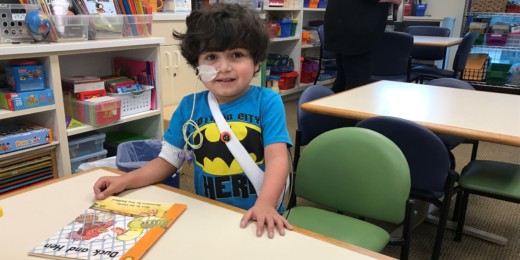Stuttering is a common problem in early childhood, and the right evidence-based treatment can help. That's what Stanford Children's speech-language pathologist Kristin McKee wishes every parent knew about stuttering.
Many kids begin to trip over their words in the years before they start school, when they rapidly add words to their vocabularies, said McKee, who specializes in treating fluency disorders in children and teens. "In the preschool years, children undergo rapid development that we call the 'language explosion' when stuttering can start to occur," she said.
Experts think stuttering may start because children's brains are suddenly called on to coordinate the activity of many different neural networks involved in speech, including those that process emotion, cognition and language. Stuttering is known to have a genetic component and is more common in boys than girls.
Some stuttering goes away on its own, while in other circumstances, kids benefit from treatment. Early intervention is beneficial, and a speech-language pathologist can help identify which children need treatment.
"One of the reasons it's so important to treat stuttering is that when children are still stuttering later in childhood, they can experience negative reactions from peers, teachers or unknowledgeable adults," McKee said. "When that happens, the child might learn to use behaviors to escape the stuttering: not saying what they really want to say, avoiding speaking situations at school, avoiding words they want to use. Adults who stutter may end up avoiding jobs that have speaking demands."
When children come in for evaluations, McKee listens closely to how they speak. Kids who occasionally repeat words without tension and hurry, or who pause and revise what they're saying, are usually experiencing typical language development and don't require treatment. However, frequent repetitions of sounds, syllables or words -- especially if the child makes three or more repetitions -- as well as prolonging or getting blocked on making certain sounds, are all signs that treatment could help. Children who have been stuttering for at least six months are more likely to need treatment, as are those who have a family history of stuttering or who begin to stutter after age 3½.
Therapies are tailored to the child's age and individual needs. With preschoolers, McKee and her colleagues often follow the Lidcombe program. This is an evidence-based approach in which the therapist and parents praise the child for instances of smooth talking, helping to encourage the formation of new neural pathways that diminish stuttering. With school-aged children and teenagers, treatment focuses on techniques to help ease into the sound of words, speak at an appropriate speed and reduce tension in how sounds are produced.
McKee also helps both children and parents to deal with their feelings about a child's stutter.
"I have a lot of nervous parents," she said. "We always point out the child's strengths -- the many things he or she is able to do well -- even in the field of communication." She offers parents tips about how to interact with their children, such as listening attentively and focusing on the content of what a child says rather than how it's said. Modeling an easy and relaxed way of talking and avoiding finishing a child's thoughts -- even when they stutter -- are also important ways parents can help.
And she encourages kids to approach speaking with courage. "Some of the most rewarding situations I've experienced when working with school-aged kids have been when they feel ready to challenge themselves," McKee said. Children she's treated have run for student council -- campaign speeches and all -- and given school presentations about stuttering to help their classmates understand it.
"We're empowering them so they're not feeling limited by their stutter," she said. "They know they're in control and their stuttering isn't going to dictate their life."
Photo by This is Awkward






